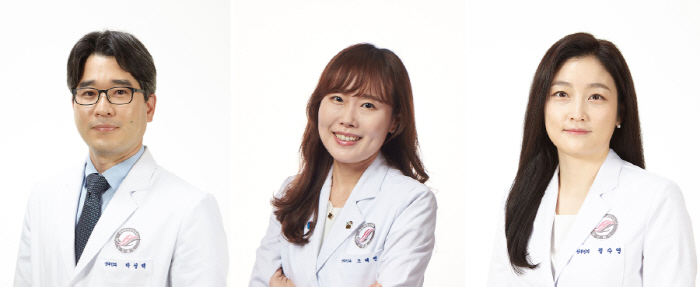Developing Immunotherapy for Cervical Cancer...Induction of anticancer through self-activation of immune cells
Nov 05, 2025
Cervical cancer is the fourth most common cancer in women around the world. The 5-year survival rate exceeds 90% at early diagnosis, but drops sharply to less than 20% at the advanced stage. In particular, treatment options for recurrent and metastatic patients are very limited, so the development of new treatments is urgent.
A research team led by Professor Park Sung-taek of the Department of Obstetrics and Gynecology at Gangnam Sacred Heart Hospital at Hallym University (Professor Cho Hye-yeon of Obstetrics and Gynecology at Dongtan Sacred Heart Hospital at Hallym University and Professor Jeong Su-young of the Department of Obstetrics and Gynecology at Gangnam Sacred Heart Hospital at Hallym University succeeded in developing a new type of immunotherapy targeting cervical cancer. Based on the 'bispecific T-cell engineer', which induces immune cells to recognize and attack cancer cells directly, a new anticancer treatment that goes beyond the limits of existing treatments is proposed.
The study was published in the International Journal of Molecular Sciences under the title of 「A Tissue Factor Bi-Specific T-Cell Engager Providers Effective Targeting and Cytotoxicity Against Cervical Cancer Cell Lines」 of the Tissue Factor target bispecific T-cell assembly.
Professor Park Sung-taek's research team recently targeted Tissue Factor (TF), the same target as Tisotumab vedotin, an antibody and drug conjugate approved as a treatment for cervical cancer, through a bispecific T-cell engine (BiTE) platform. BiTE is an antibody that induces immune cells to directly attack tumor cells, and it is attracting attention with its success in the field of blood cancer.
The research team developed a bispecific T-cell assembly TF-BiTE that targets tissue factor TF in cervical cancer cells and proved its effectiveness.
After confirming the high expression of TF in cervical cancer patient tissues and cell lines, 'TF-BiTE' was produced, combining a single-chain antibody (scFv) that recognizes TF and a single-chain antibody that recognizes CD3 in T cells, an immune cell. This treatment directly connects T cells to cervical cancer cells to induce immune cells to attack cancer cells efficiently.
As a result of the study, it was confirmed that tissue factors (TF) are expressed at a very high rate in the tissues of cervical cancer patients. TF was expressed in 86.3% (145/163) of squamous cell carcinoma and 85.2% (58/68) of adenocarcinoma, and it was not detected in normal cervical tissue.
In addition, treatment of TF-targeted bispecific antibodies (TF-BiTE) on cervical cancer cell lines (SiHa, HeLa, ME-180) clearly showed an immune cell response (antigen-specific cytotoxicity) that selectively attacked only cancer cells. The rate of cell destruction (dissolution rate) was also significantly increased in all cancer cell lines, whereas no cell death was observed in normal or control cells (CT-26) without TF.
In addition, T-cell activation indicators (CD25, CD69) increased significantly in TF-BiTE-treated cells, and the secretion of cytokines (TNF-α, IFN-γ, IL-2) that induce immune responses was significantly higher than that of the control group (BiTE-CD19). In addition, as a result of T-cell degranulation (CD107a) analysis, it was confirmed that TF-BiTE had a strong immune-mediated anticancer effect as cell death responses were significantly induced in both CD4 and CD8 T cells.
These results demonstrate a new immune mechanism by which TF-BiTE recognizes TF of cervical cancer cells to activate immune cells, and T cells directly kill cancer cells. In particular, a distinct apoptosis effect was also confirmed in cervical adenocarcinoma subtypes with high TF expression, showing new therapeutic potential in adenocarcinoma patients whose existing treatment was limited.
This study is significant in that it has opened up new possibilities for cervical cancer treatment strategies by activating immune cells themselves to induce anticancer effects, unlike existing antibody and drug treatments led by a domestic research team.
In the future, the research team plans to lay the groundwork for clinical application, such as the possibility of using immune checkpoint inhibitors in combination.
Professor Park Sung-taek said "Reoccurrence and metastatic cervical cancer has limited treatment options" and "This study is an important turning point that presents new treatment possibilities for patients with cervical cancer who do not respond to existing treatment or relapsed."
This study was conducted in collaboration with EIONCELL. IonCell is a bio venture company established in 2022. Its core business is to develop immune cell targeted chemotherapy drugs and next-generation bispecific antibody (BiTE) platforms. Recently, AI-based antibody design and optimization technology has been used to strengthen the ability to develop next-generation immune anticancer drugs, and the technology has been verified in domestic and international papers.
CEO of IonCell Kim Hyung-soo (Professor of Hematologic Oncology, Gangnam Sacred Heart Hospital, Hanlim University) said "IonCell is focusing on developing an innovative treatment that enables immune cells to accurately recognize and attack tumor cells based on the next generation of bispecific antibody (BiTE) platform targeting tissue factors."In the future, we will expand our coverage beyond cervical cancer to solid cancers such as ovarian cancer and lung cancer to accelerate the commercialization of patient-specific precision immunotherapy drugs and leap forward as a global company in BiTE new drug development."
A research team led by Professor Park Sung-taek of the Department of Obstetrics and Gynecology at Gangnam Sacred Heart Hospital at Hallym University (Professor Cho Hye-yeon of Obstetrics and Gynecology at Dongtan Sacred Heart Hospital at Hallym University and Professor Jeong Su-young of the Department of Obstetrics and Gynecology at Gangnam Sacred Heart Hospital at Hallym University succeeded in developing a new type of immunotherapy targeting cervical cancer. Based on the 'bispecific T-cell engineer', which induces immune cells to recognize and attack cancer cells directly, a new anticancer treatment that goes beyond the limits of existing treatments is proposed.
The study was published in the International Journal of Molecular Sciences under the title of 「A Tissue Factor Bi-Specific T-Cell Engager Providers Effective Targeting and Cytotoxicity Against Cervical Cancer Cell Lines」 of the Tissue Factor target bispecific T-cell assembly.
Professor Park Sung-taek's research team recently targeted Tissue Factor (TF), the same target as Tisotumab vedotin, an antibody and drug conjugate approved as a treatment for cervical cancer, through a bispecific T-cell engine (BiTE) platform. BiTE is an antibody that induces immune cells to directly attack tumor cells, and it is attracting attention with its success in the field of blood cancer.
The research team developed a bispecific T-cell assembly TF-BiTE that targets tissue factor TF in cervical cancer cells and proved its effectiveness.
After confirming the high expression of TF in cervical cancer patient tissues and cell lines, 'TF-BiTE' was produced, combining a single-chain antibody (scFv) that recognizes TF and a single-chain antibody that recognizes CD3 in T cells, an immune cell. This treatment directly connects T cells to cervical cancer cells to induce immune cells to attack cancer cells efficiently.
As a result of the study, it was confirmed that tissue factors (TF) are expressed at a very high rate in the tissues of cervical cancer patients. TF was expressed in 86.3% (145/163) of squamous cell carcinoma and 85.2% (58/68) of adenocarcinoma, and it was not detected in normal cervical tissue.
In addition, treatment of TF-targeted bispecific antibodies (TF-BiTE) on cervical cancer cell lines (SiHa, HeLa, ME-180) clearly showed an immune cell response (antigen-specific cytotoxicity) that selectively attacked only cancer cells. The rate of cell destruction (dissolution rate) was also significantly increased in all cancer cell lines, whereas no cell death was observed in normal or control cells (CT-26) without TF.
In addition, T-cell activation indicators (CD25, CD69) increased significantly in TF-BiTE-treated cells, and the secretion of cytokines (TNF-α, IFN-γ, IL-2) that induce immune responses was significantly higher than that of the control group (BiTE-CD19). In addition, as a result of T-cell degranulation (CD107a) analysis, it was confirmed that TF-BiTE had a strong immune-mediated anticancer effect as cell death responses were significantly induced in both CD4 and CD8 T cells.
These results demonstrate a new immune mechanism by which TF-BiTE recognizes TF of cervical cancer cells to activate immune cells, and T cells directly kill cancer cells. In particular, a distinct apoptosis effect was also confirmed in cervical adenocarcinoma subtypes with high TF expression, showing new therapeutic potential in adenocarcinoma patients whose existing treatment was limited.
This study is significant in that it has opened up new possibilities for cervical cancer treatment strategies by activating immune cells themselves to induce anticancer effects, unlike existing antibody and drug treatments led by a domestic research team.
In the future, the research team plans to lay the groundwork for clinical application, such as the possibility of using immune checkpoint inhibitors in combination.
Professor Park Sung-taek said "Reoccurrence and metastatic cervical cancer has limited treatment options" and "This study is an important turning point that presents new treatment possibilities for patients with cervical cancer who do not respond to existing treatment or relapsed."
This study was conducted in collaboration with EIONCELL. IonCell is a bio venture company established in 2022. Its core business is to develop immune cell targeted chemotherapy drugs and next-generation bispecific antibody (BiTE) platforms. Recently, AI-based antibody design and optimization technology has been used to strengthen the ability to develop next-generation immune anticancer drugs, and the technology has been verified in domestic and international papers.
CEO of IonCell Kim Hyung-soo (Professor of Hematologic Oncology, Gangnam Sacred Heart Hospital, Hanlim University) said "IonCell is focusing on developing an innovative treatment that enables immune cells to accurately recognize and attack tumor cells based on the next generation of bispecific antibody (BiTE) platform targeting tissue factors."In the future, we will expand our coverage beyond cervical cancer to solid cancers such as ovarian cancer and lung cancer to accelerate the commercialization of patient-specific precision immunotherapy drugs and leap forward as a global company in BiTE new drug development."
|
This article was translated by Naver AI translator.














